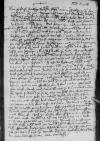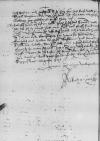Letter #3713
Albrecht CUON to Ioannes DANTISCUSAvila, 1531-08-23
| received Leuven (Lovanium), 1531-09-03 Manuscript sources:
Auxiliary sources:
| ||||||
Text & apparatus & commentary Plain text Text & commentary Text & apparatus
+
Al Illustre y muy Magnifico Señor, el señor
En la corte de su
Mein geflissen willig dienst seyen Ewern Gnaden alzeit zu foran berait.
Gnediger Her. /
Vorgangenen tag hab ich Ewern Gnaden cf.
Darmit gebe in Ewer Gnaden ursach sich alss ich fur war nit anderst hör und wais sich disserlicher und einzogner auch daz kind diss bas hielt, / dieweil mich Ewer Gnaden procurator gemacht hat / soll ich billich procurieren, daz mich gedunct von nöten sey. / Dan si ist auch zum offtern mall kranck / und in ainer krankhait gat bald vill gelt auff / darumb ist von nöten, Ewer Gnaden daz best thue und an X / oder XX dausend umb gotz willen geb. / So will ich sunsst in allen auff sichen und ier und den kind kain mangel lassen.
Ich hab yr auch geschriben, daz si hin fur iere brief woll zu mad... den
So hob ich Ewer Gnaden bistum halber guten beschaid vernomen, / wöll Got Ewer Gnaden daz lang zeit mit frid und grossen freüden messen lassen. / Waiss Ewer Gnaden uff dissmall nichts weiters zu schreib[en], dan ich ain beser kantzleyer bin wais die stillennn der kantzley nit sonder der groben kaffleut und danocht denselben nit woll, / darumb soll mir Ewer Gnaden billich verzeihen thue ich in mein schreiben Ewern Gnaden nit behörlich Eur [Gnaden] auff. / Warin ich Ewern Gnaden dienen kan, soll si mich allzeit willig und ungespart finden.
Datum
Ewer Gnaden alzeit williger diener


